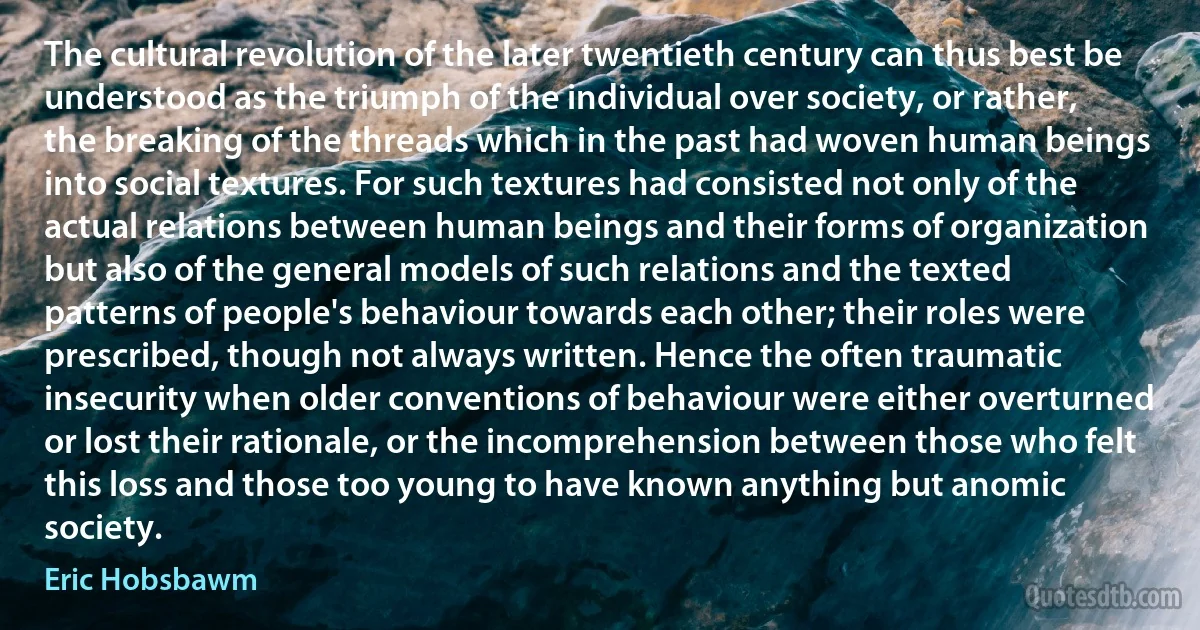
The cultural revolution of the later twentieth century can thus best be understood as the triumph of the individual over society, or rather, the breaking of the threads which in the past had woven human beings into social textures. For such textures had consisted not only of the actual relations between human beings and their forms of organization but also of the general models of such relations and the texted patterns of people's behaviour towards each other; their roles were prescribed, though not always written. Hence the often traumatic insecurity when older conventions of behaviour were either overturned or lost their rationale, or the incomprehension between those who felt this loss and those too young to have known anything but anomic society.
Eric HobsbawmRelated topics
anything best breaking century felt general human incomprehension insecurity known later loss lost organization past revolution thus traumatic write young relationsRelated quotes
The upshot is that the values and goals which provided a unifying center for previous centuries in the modern period no longer are cogent. We have not yet found the new center which will enable us to choose our goals constructively, and thus to overcome the painful bewilderment and anxiety of not knowing which way to move. Another root of our malady is our loss of the sense of the worth and dignity of the human being. Nietzsche predicted this when he pointed out that the individual was being swallowed up in the herd, and that we were living by a "slave-morality." Marx also predicted it when he proclaimed that modern man was being "de-humanized," and Kafka showed in his amazing stories how people literally can lose their identify as persons.

Rollo May
Gandhi remained committed to nonviolence; I followed the Gandhian strategy for as long as I could, but then there came a point in our struggle when the brute force of the oppressor could no longer be countered through passive resistance alone. We founded Umkhonto we Sizwe and added a military dimension to our struggle. Even then, we chose sabotage because it did not involve the loss of life, and it offered the best hope for future race relations. Militant action became part of the African agenda officially supported by the Organization of African Unity (O. A. U.) following my address to the Pan-African Freedom Movement of East and Central Africa (PAFMECA) in 1962, in which I stated, "Force is the only language the imperialists can hear, and no country became free without some sort of violence."

Nelson Mandela
Such cultural homosexuality is an alienation more or less forced upon certain groups of Auden's society by the form of their education and the nature of their social and financial conditions. Where the members of a class and a sex are taught, in a prolonged narcissistic isolation, to hero-worship themselves-class and sex; where-to a different class-unemployment is normal, where one's pay is inadequate or impossible for more than one; where children are expensive liabilities instead of assets; where women are business competitors; where most social relationships have become as abstract, individualistic, and mobile as the relations of the labor market, homosexuality is a welcome asset to the state, one of the cheapest and least dangerous forms of revolution.

Randall Jarrell
The professional administrators - especially those at higher levels - serve key roles at the boundary of the organization, between the professionals inside and interested parties - governments, client associations, and so on - on the outside. On the one hand, the administrators are expected to protect the professionals' autonomy, to "buffer" them from external pressures. On the other hand, the administrators are expected to woo these outsiders to support the organization, both morally and financially. Thus, the external roles of the manager-maintaining liaison contacts, acting as figurehead and spokesman in a public relations capacity, negotiating with outside agencies-emerge as primary ones in professional administration.

Henry Mintzberg
Justice is the end of government. It is the end of civil society. It ever has been, and ever will be, pursued, until it be obtained, or until liberty be lost in the pursuit. In a society, under the forms of which the stronger faction can readily unite and oppress the weaker, anarchy may as truly be said to reign, as in a state of nature where the weaker individual is not secured against the violence of the stronger: And as in the latter state even the stronger individuals are prompted by the uncertainty of their condition, to submit to a government which may protect the weak, as well as themselves: so in the former state, will the more powerful factions be gradually induced by a like motive, to wish for a government which will protect all parties, the weaker as well as the more powerful.

Alexander Hamilton
